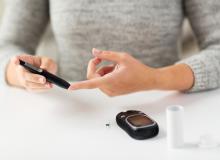Blood glucose monitoring is the regular check of blood glucose levels. As one of the "five carriages" for controlling diabetes, it is of great significance. The implementation of blood sugar monitoring can better control the blood sugar changes of diabetic patients; it has important guiding significance for provincial regulations, activities, diet and rational use of medication, and can help patients find problems at any time and seek medical treatment in a timely manner.
"People with diabetes who don't know their blood sugar status are like soldiers who go to war without weapons. The level of danger is similar." - American Association of Diabetes Educators (AADE).
Selection of time points for blood glucose monitoring:
Because meals have a great impact on blood sugar changes, the commonly used blood sugar monitoring time points include 2 hours before three meals and three hours after three meals. If you add blood sugar monitoring before dinner and 3 a.m., it can be regarded as full-day coverage.
Generally, there is no need to monitor blood sugar 8 times a day, mainly in the early stages of adjusting and treating high blood sugar, when combined with other diseases that affect blood sugar changes, or when you have just been diagnosed with diabetes and need to understand the pattern of your own blood sugar changes. After a period of blood sugar monitoring, after understanding the changing patterns of blood sugar and adjusting and treating blood sugar in a timely manner to reach the target stably, there is no need to measure it so frequently.
Blood glucose monitoring at each time point and its significance:
Fasting blood sugar: refers to the blood sugar value measured by blood sampling when fasting overnight for more than 8 hours, without exercise or emotional impact before breakfast, and without taking anti-diabetic drugs. Fasting blood glucose reflects the basal glucose metabolism after an overnight rest, and also reflects the level of insulin secretion to maintain basic physiological activities during rest.
Pre-meal blood sugar: refers to the blood sugar measured before breakfast, lunch and dinner. Mainly refers to the blood sugar situation before lunch and dinner, which reflects the relative fasting state before eating again after gastric emptying of the previous meal (usually 4 hours). It is affected by the food intake of the previous meal and the efficacy of anti-diabetic drugs, and of course also by the meal. Effects of post-exercise and mood changes.
2-hour postprandial blood sugar: refers to the blood sugar measured 2 hours after breakfast, lunch and dinner, reflecting the impact of meals on blood sugar. Normal blood sugar 2 hours after a meal is <7.8mmol/L.
(Note: 2 hours after a meal starts from the first bite of the meal, not after the end of the meal. However, if the meal takes more than 20 minutes for various reasons, it can be estimated at the middle time of the meal, or based on the second meal Time for one bite of staple food).
Random blood sugar: blood sugar measured at any time of the day, such as before going to bed, at midnight, when you feel abnormal, etc. It reflects the blood sugar level at that time and is affected by various factors that affect blood sugar before testing.
Only through effective monitoring can we accurately judge whether our blood sugar-lowering measures are in place, and control blood sugar better and more effectively.

